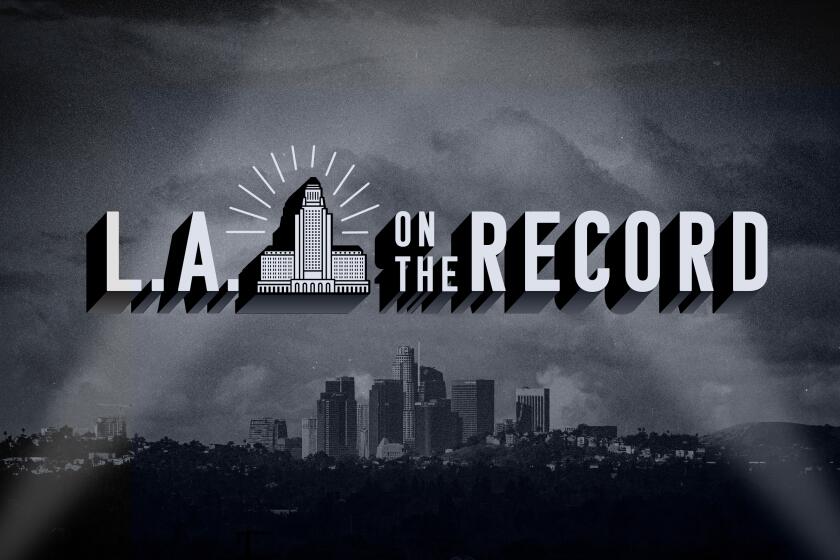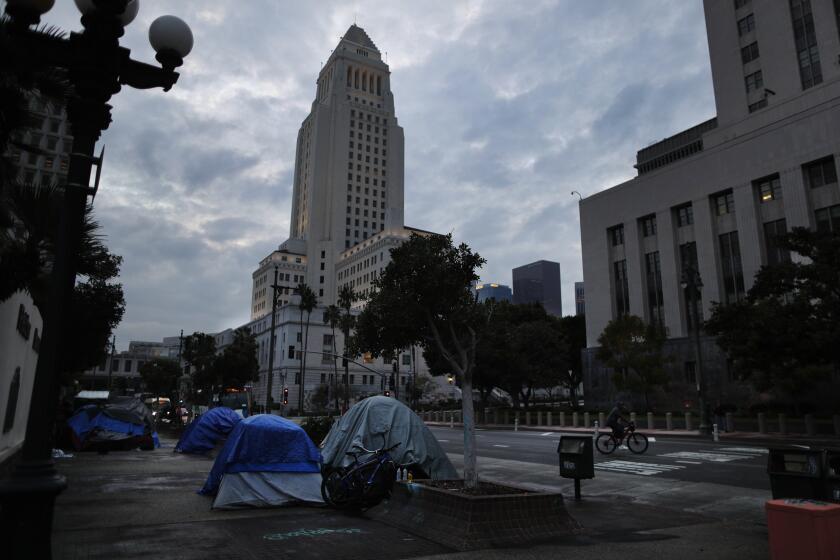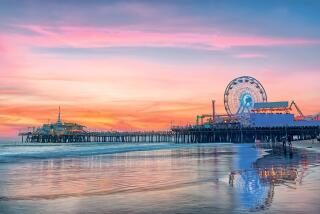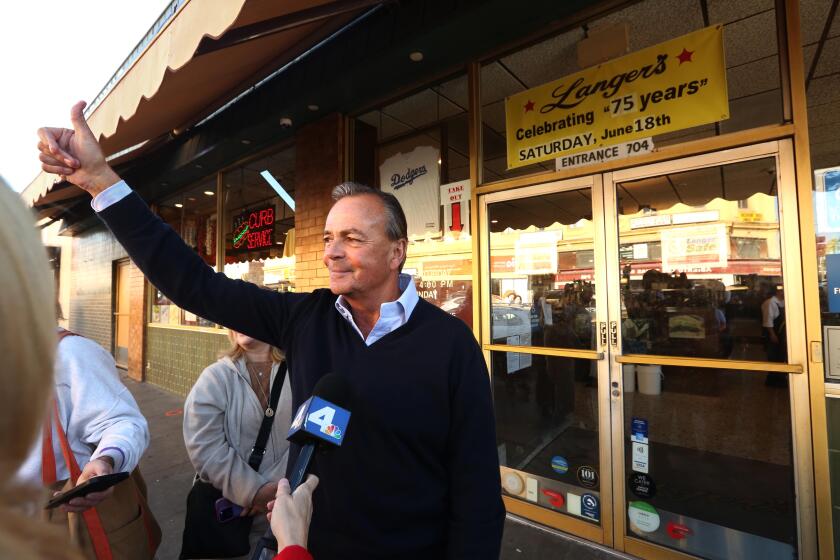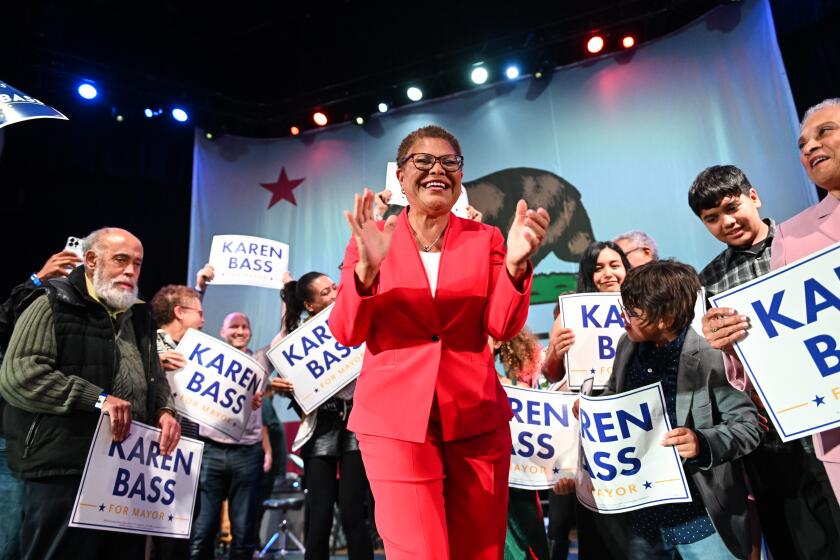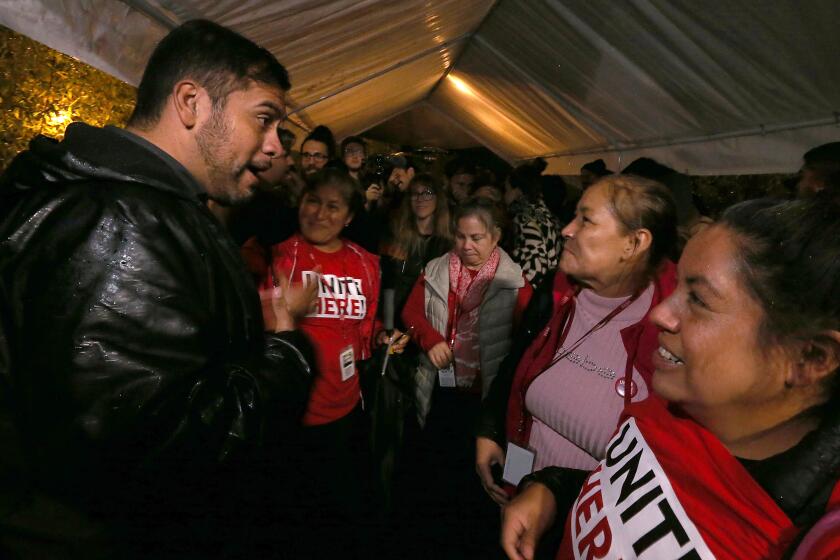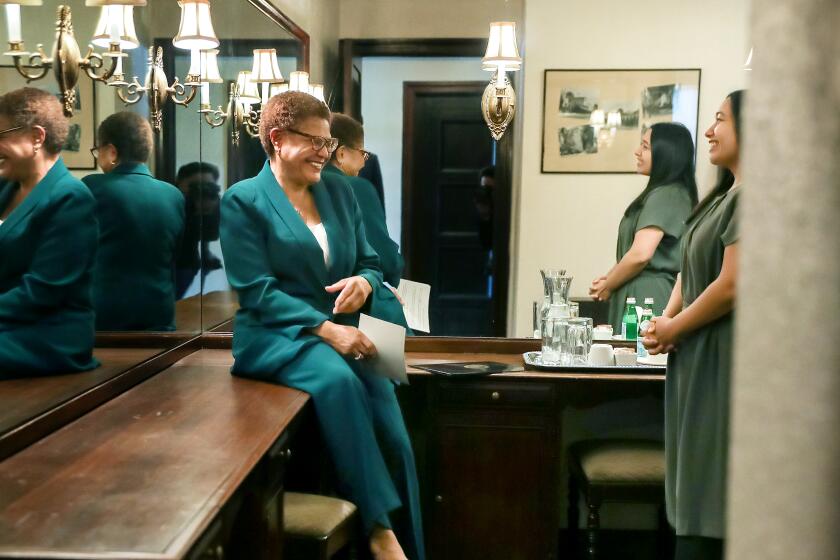Column: Will L.A.’s mayoral race channel Orange County?
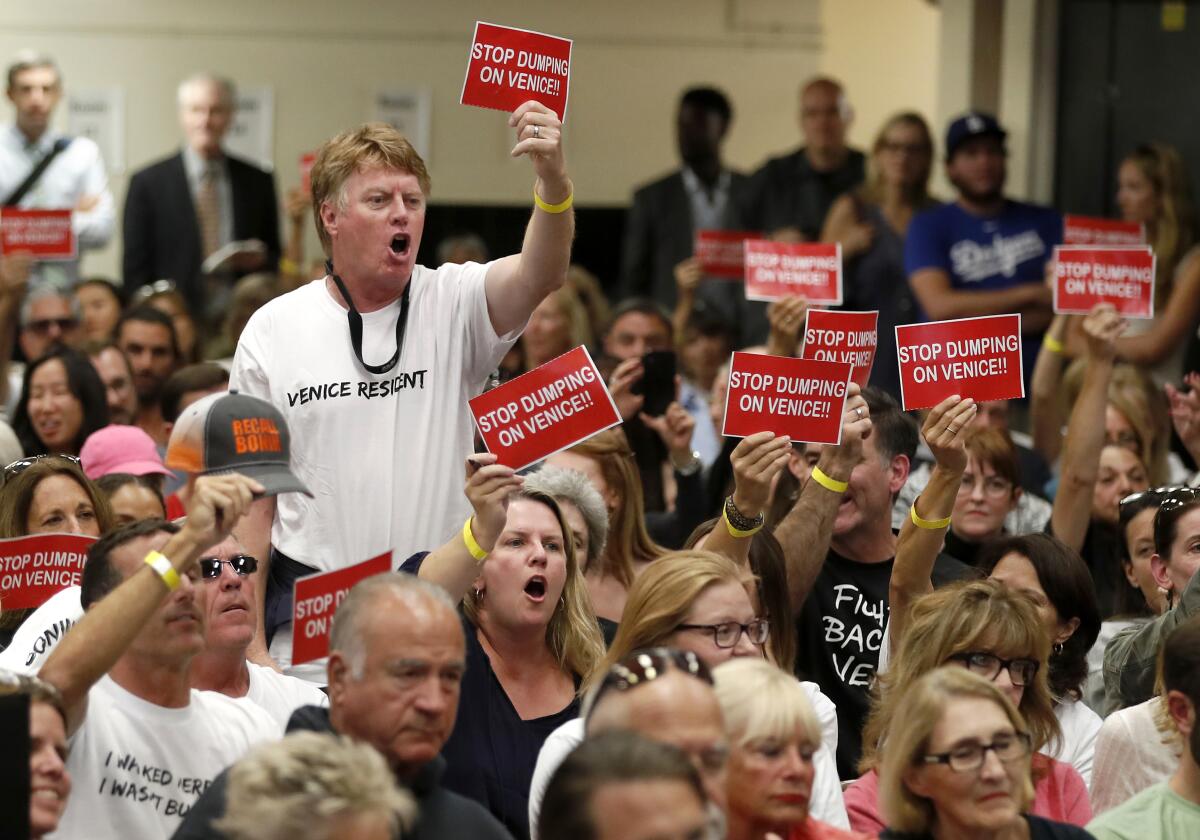
It was a simple tweet, a throwaway thought I sent out during the Super Bowl. NBC had just showed an aerial view of Echo Park Lake in all of its Sunday afternoon glory, I was in between chicken wings, and I felt inspired to yap.
“Did that [footage] show the fence that keeps out people from living in it?” I tweeted.
I sent out my query both as an honest question and as commentary. The issue is one that continues to roil Echo Park, nearly a year after city workers installed a chain-link barrier around the lake in the wake of the clearance of a large homeless encampment in March. The unhoused didn’t disappear, of course — they simply dispersed to other, poorer areas of the city.
I went on to tweet out other random observations during the game. But it was the Echo Park remark that got the most attention of Angelenos.
Angry Angelenos.
Response after response, public and private, praised the restoration of “order” to Echo Park. Folks offered all sorts of anecdotes about how bad life there supposedly was before the fence arose. Feces on grass and sidewalks. Nonstop assaults and drug use. A desecration of a beloved L.A. public space.
I was accused of being cool with all of that.
What struck me about the Twitter barrage were the identities of many of the people who joined the pile-on. I would’ve figured them to be a conservative Karen brigade. Instead, many were self-identified Democrats or progressives.
They’re part of a potential voter revolt that will make L.A.’s upcoming mayoral election a fascinating referendum on how much the city is scared of itself right now. From Pacific Palisades to Boyle Heights, South Los Angeles to the San Fernando Valley, there’s a level of discontent among the city’s liberals I would’ve never imagined in the megalopolis.
It’s supposed to be a cauldron of woke politics, the type of place where voters cast 75% of their ballots in the 2020 presidential election for Joe Biden. But all I’m hearing from good liberals in the lead-up to the June mayoral primary is fear. Too many unhoused people. Too much crime. Clueless politicians. A loss of traditions and safety. A fear that Los Angeles isn’t a nice place to raise a family anymore — and not just because of the astronomical housing market.
The Los Angeles Times newsletter L.A. on the Record has insider tidbits and explainers on local elections, politics and the people who run this town.
This chorus is very familiar to me. Quality-of-life issues have been voter catnip in my Orange County homeland for generations. It’s why politicians here have long campaigned on tough-on-crime rhetoric and consistently invoke L.A. as the bogeyman that Orange County could turn into if liberals are allowed to take office.
Now, this strategy of spotlighting L.A.’s warts is one nearly all the declared mayoral candidates — all Democrats — seem to be banking on in their quest to govern the City of Angels.
Councilmember Joe Buscaino and L.A. City Atty. Mike Feuer are casting themselves as the adults in the room, vowing to take away the toys from their more-liberal colleagues. Rep. Karen Bass, the candidate who has so far most excited the Angeleno Left, just upset a bunch of them after she proposed to put more, not fewer, police officers on the street.
Kevin De León is running as a true-blue bleeding heart, yet the councilmember paradoxically stands little chance of winning in a city that’s nearly half Latino. Now comes billionaire Rick Caruso ready to steamroll everyone with his self-funded campaign — and promising to add 1,500 cops.
Wait, what city is holding a nationally watched election this summer: Los Angeles, or Irvine?
We now have a full field of candidates for Los Angeles mayor. Can any of them solve the homelessness crisis?
I admit I’m a novice to L.A. politics — but maybe that grants me perspective on the subject. So trust me when I say this: as L.A. prepares for the most consequential mayoral election in a generation, an Orange County state of mind is infecting the body politic. The whines, the paranoia, the bromides against the status quo, the pining for simpler days — Los Angeles in 2022 sounds like Orange County circa 1994.
I’m not dismissing concerns residents have about how things are. As someone who has seen loved ones deal with criminal violence, having your sense of safety shattered is never good. But neither is ignoring how good you actually have it.
I’ve never understood the doom-and-gloom so many people throw on L.A. Sure, traffic is bad, but not much worse than what we in Orange County have to deal with on 405 and 55 freeways any time after 1 p.m. (and nowhere near what poor Riverside undergoes around the clock.) Poverty and crime? Name me a huge American city that doesn’t have either. And name me another huge American city that, despite its troubles, still has L.A.’s capacity for reinvention, its propensity to look toward the future instead of the past, its symphony of street vendors and sunsets at the Hollywood Bowl or Dodger Stadium.
As I’ve drilled deeper into Los Angeles in the year-plus that I’ve been a columnist, my feeling that too many people exaggerate the city’s woes remains. Yes, times are tough for too many — but it’s nowhere near the apocalypse that people make it out to be.
Take crime. Murders have increased in the past two years, and robberies are now ticking upward. But they’re nowhere near the historic highs of the 1980s and 1990s. The difference now is that the crime waves of the past crashed down on Black and Latino communities and didn’t affect the middle and upper classes. Same with homelessness. Now that inconveniences are lapping at neighborhoods that always imagined themselves as “better” than others, those residents are all of a sudden hoisting rhetorical pitchforks and torches and demanding political action?
Fifty-nine percent of voters said they would support changing the law to potentially allow for more felony prosecutions.
Venice, heal thyself. You’re turning into Huntington Beach.
Early polling does show Bass with a commanding lead among mayoral candidates. But don’t discount angry liberals. A bunch of them in San Francisco just recalled three school trustees who were too Left, and will probably also topple the city’s progressive district attorney, Chesa Boudin. Grievance politics can easily sweep up anyone. Woe to Angelenos who fall for this trap.
Look how it’s worked out in Orange County.
That sort of thinking has mortgaged the future to fix the perceived problems of the present, and working-class cities and neighborhoods have almost always borne the brunt of the aftermath. Voting like that will put Los Angeles onto a path of reactionary Band-Aids that don’t let the wounds of the city heal.
It takes me back to that Echo Park Lake fence that I spent more time on during Super Bowl Sunday than I would’ve ever imagined. A similar situation happened a couple of years ago in O.C., along the Santa Ana River near Angel Stadium. County officials put up a long fence and threw down rocks along its trails to clear out a homeless encampment that numbered over 700 people — more than thrice the population of the Echo Park Lake tent city.
Today, the Santa Ana River sees joggers and cyclists do their circuits unperturbed. The homeless, of course, moved on to camp in nearby neighborhoods and cities. That spurred calls by residents and politicians there for a heavier approach than before, and not-my-fault excuses by the bureaucrats who pushed out the homeless in the first place.
Trust me, L.A. You don’t want to follow the Orange County playbook’s unbroken circle of scorn.
More to Read
Sign up for Essential California
The most important California stories and recommendations in your inbox every morning.
You may occasionally receive promotional content from the Los Angeles Times.
